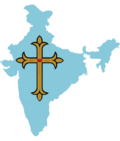
The liturgical year, also called the church year, Christian year or kalendar, consists of the cycle of liturgical seasons in Christian churches that determines when feast days, including celebrations of saints, are to be observed, and which portions of Scripture are to be read either in an annual cycle or in a cycle of several years.
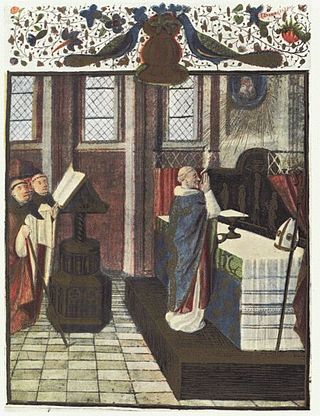
Mass is the main Eucharistic liturgical service in many forms of Western Christianity. The term Mass is commonly used in the Catholic Church, Western Rite Orthodoxy, Old Catholicism, and Independent Catholicism. The term is also used in some Lutheran churches, as well as in some Anglican churches, and on rare occasion by other Protestant churches.

Ash Wednesday is a holy day of prayer and fasting in many Western Christian denominations. It is preceded by Shrove Tuesday and marks the first day of Lent, the six weeks of penitence before Easter.
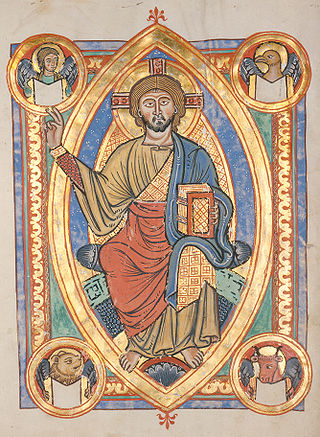
The Stations of the Cross or the Way of the Cross, also known as the Way of Sorrows or the Via Crucis, refers to a series of images depicting Jesus Christ on the day of his crucifixion and accompanying prayers. The stations grew out of imitations of the Via Dolorosa in Jerusalem, which is a traditional processional route symbolising the path Jesus walked to Mount Calvary. The objective of the stations is to help the Christian faithful to make a spiritual pilgrimage through contemplation of the Passion of Christ. It has become one of the most popular devotions and the stations can be found in many Western Christian churches, including those in the Roman Catholic, Lutheran, Anglican, and Methodist traditions.

The Syro-Malabar Church, also known as the Syro-Malabar Catholic Church, is an Eastern Catholic Church based in Kerala, India. It is a sui iuris (autonomous) particular Church in full communion with the Pope and the worldwide Catholic Church, including the Latin Church and the 22 other Eastern Catholic Churches, with self-governance under the Code of Canons of the Eastern Churches (CCEO). The Church is headed by the Major Archbishop of the Syro-Malabar, Raphael Thattil. The Syro-Malabar Synod of Bishops canonically convoked and presided over by the Major Archbishop constitutes the supreme authority of the Church. The Major Archiepiscopal Curia of the Church is based in Kakkanad, Kochi. Syro-Malabar is a prefix reflecting the church's use of the East Syriac Rite liturgy and origins in Malabar. The name has been in usage in official Vatican documents since the nineteenth century.

Compline, also known as Complin, Night Prayer, or the Prayers at the End of the Day, is the final prayer liturgy of the day in the Christian tradition of canonical hours, which are prayed at fixed prayer times.

A novena is an ancient tradition of devotional praying in Christianity, consisting of private or public prayers repeated for nine successive days or weeks. The nine days between the Feast of the Ascension and Pentecost, when the disciples gathered in the upper room and devoted themselves to prayer, is often considered to be the first novena.

Alphonsa of the Immaculate Conception, FCC ; 19 August 1910 – 28 July 1946), was a nun in the Franciscan Clarist Congregation and an educator by profession. She was also known for being a victim soul, visionary and prophetess in the Kottayam pergunna of the erstwhile Travancore province of British India, in the present-day Kerala, India.

The Archeparchy of Changanacherry is a Syro-Malabar Catholic archeparchy with an area of 24,595 km2 comprising the districts of Kottayam, Alappuzha, Pathanamthitta, Kollam, and Thiruvananthapuram in Kerala, and also Kanyakumari district in Tamil Nadu. It is one of the largest Catholic dioceses in India in terms of area. Joseph Perumthottam is the current Metropolitan Archbishop, serving since 2007. Thomas Tharayil has been the auxiliary bishop since 2017. Suffragan eparchies of the Changanassery archeparchy includes Palai, Kanjirappally-Nilackal, and Thuckalay-Thiruvithancode.
In the history of Christianity, the African Rite refers to a now defunct Christian, Latin liturgical rite, and is considered a development or possibly a local use of the primitive Roman Rite. Centered around the Archdiocese of Carthage in the Early African church, it used the Latin language.
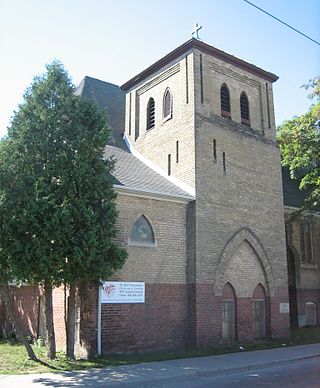
St Bartholomew's Anglican Church is a parish of the Diocese of Toronto in the Anglican Church of Canada. It is a ministry in collaboration with the Cathedral Church of St. James. Located in the Regent Park area of Toronto, the congregation operates several outreach programs. It is an Anglo-Catholic parish maintaining 'Full Catholic Privileges'.
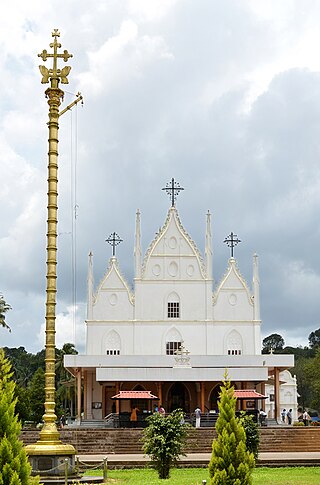
Cherpunkal is a small town in the Kottayam district of Kerala State in India on the Kottayam-Palai Road, seven kilometers from Palai city.

This is a timeline of the history of the Syro-Malabar Catholic Church in India.
The Missionary Society of St Thomas, abbreviated M.S.T. is an Eastern Catholic missionary organization founded in 1968 in Kerala by the Syro Malabar Catholic Church, for missionary work in "less Christian areas" in and outside India. It was founded by Bishop Sebastian Vayalil as a society of apostolic life for men.

Lent is the solemn Christian religious observance in the liturgical year commemorating the 40 days Jesus Christ spent fasting in the desert and enduring temptation by Satan, according to the Gospels of Matthew, Mark and Luke, before beginning his public ministry. Lent is usually observed in the Catholic, Lutheran, Moravian, Anglican, United Protestant and Orthodox Christian traditions, among others. Some Anabaptist, Baptist, Methodist, Reformed, and nondenominational Christian churches also observe Lent, although many churches in these traditions do not.

The St. Thomas the Apostle Syro-Malabar Catholic Eparchy of Melbourne is a Syro-Malabar Catholic Church ecclesiastical territory or eparchy of the Catholic Church in Australia. The eparchy was erected by Pope Francis on 11 January 2014. This is the second eparchy of the Syro-Malabar Church outside India, after the Eparchy of Chicago, and it has jurisdiction over Syro-Malabar Catholics in the entirety of Australia.

The Eparchy of Palai is a Syro-Malabar Catholic ecclesiastical territory or eparchy of the Catholic Church with an area of 1166 km2 comprising the Meenachil taluk and a few villages of the neighbouring taluks in Kottayam, Ernakulam, and Idukki districts of central Kerala in South India. The faithful of this eparchy, numbering 326,742, belong to the ancient St. Thomas Christian community. The seat of the bishop is the St. Thomas Cathedral based in the town of Palai. The current bishop is Joseph Kallarangatt, serving since March 2004. Jacob Muricken has been auxiliary bishop since 2012.
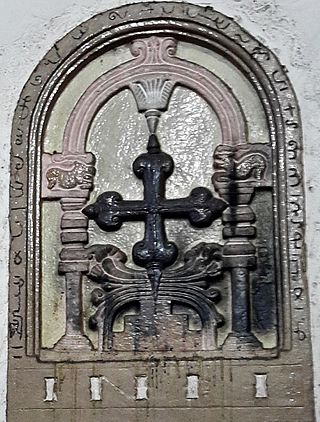
Several historical evidences shed light on a significant Malankara–Persian ecclesiastical relationship that spanned centuries. While an ecclesiastical relationship existed between the Saint Thomas Christians of India and the Church in Sassanid Empire in the earlier centuries, closer ecclesiastical ties developed as early as seventh century, when India became an ecclesiastical province of the Church of the East, albeit restricted to matters of purely ecclesiastical nature such as ordination of priests, and not involved in matters of temporal administration. This relationship endured until the Portuguese protectorate of Cochin of Malabar came to be in 16th century, and the Portuguese discovery of a sea route to India. The Christians who came under the two ancient yet distinct lineages of Malankara and Persia had one factor in common: their Saint Thomas heritage. The Church of the East shared communion with the Great Church until the Council of Ephesus in the 5th century, separating primarily over differences in Christology.
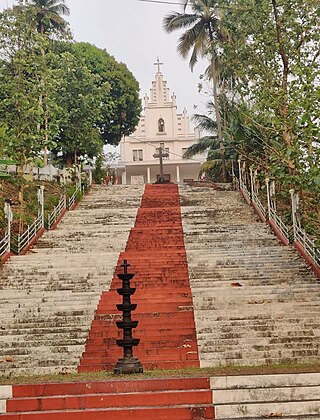
St. Antony's Church is a Catholic place of worship in the village of Kuninji in Idukki district of Kerala.

















